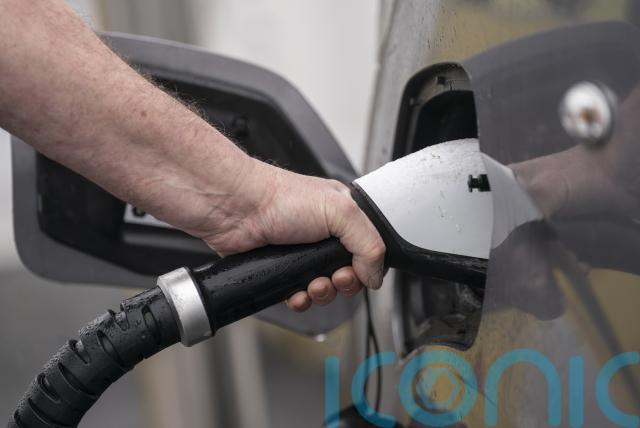
Announcing a per mile charge for electric vehicles (EVs) in the Budget could be viewed as a “poll tax on wheels”, a motoring group has warned.
Chancellor Rachel Reeves will unveil a policy to introduce a 3p per mile fee for EVs when she delivers her November 26 Budget, the Daily Telegraph reported.
The scheme is set to be implemented in 2028 following a consultation, and would cost average EV drivers £250 per year, according to the newspaper.
A Government spokesperson said it is “right to seek a tax system that fairly funds roads, infrastructure and public services”.
The Treasury is suffering from a reduction in revenue from fuel duty, as more drivers switch from petrol or diesel cars to EVs.
Successive governments have found the prospect of introducing per-mile charges for driving – sometimes referred to as road pricing – to be too politically toxic.
AA president Edmund King said: “Whilst we acknowledge the Treasury is losing fuel duty revenue as drivers go electric, the Government has to tread carefully unless their actions slow down the transition to EVs.
“The Zev mandate for 28% of new car sales to be zero emissions this year will not be met as sales are running at just 22%.
“We need to see the detail of this proposal to ascertain whether these new taxes will be equitable or a poll tax on wheels.”
The so-called poll tax – introduced by Margaret Thatcher’s government in Scotland in 1989 and then England and Wales the following year – was a fixed payment for all adults, which sparked violent protests.
The Daily Telegraph said Ms Reeves’s EV scheme will involve users estimating how far they will drive over the following 12 months, and making an extra payment on top of vehicle excise duty (VED).
If they drive more they will need to top up this amount, while some of the money would carry over to the next year if someone clocks up fewer miles.
Journey examples of a 3p per mile fee include £12 between London and Edinburgh, £5 between Cambridge and Bristol, and £2 between Liverpool and Leeds.
EVs’ exemption from VED was removed in April.
Ginny Buckley, chief executive of EV advice site Electrifying.com, said: “This is yet another example of mixed messaging from the Government.
“Drivers are being encouraged to go electric, then hit with the threat of new taxes – you can’t drive the EV transition with one foot on the accelerator and the other on the brake.

“This adds extra cost for EV drivers who can’t charge at home and already pay more per mile on public chargers than many petrol drivers.
“It also penalises those who switched in good faith, based on promised savings.”
She added that if the Government introduces this it should also unfreeze fuel duty, which has not risen with inflation for more than 14 years.
Tanya Sinclair, chief executive of lobby group Electric Vehicles UK, said there is “no doubt” the system of paying for vehicle usage “needs fundamental reform”, but stressed the importance of how this happens.
She added: “Government must take the time to consult properly, design carefully and communicate transparently – a process that will take years, not months.”
Steve Gooding, director of motoring research charity the RAC Foundation, said: “The era of oil-powered motoring is coming to an end, and with it the end of the fuel duty cash-cow that has helped balance the Treasury books for so many years.
“If the Chancellor is tempted to go down the route of introducing a distance charge for EV drivers but still encourage EV take-up, then she needs to look at how to cut the cost of public charging for the millions of people who don’t have the option to charge their cars at home.”
Ian Plummer, chief commercial officer at online vehicle marketplace Autotrader, said: “We need more carrot and less stick if we’re serious about the electric transition.
“The Chancellor clearly needs to raise revenue but if she wants to encourage EV adoption, she should think extremely carefully before introducing pay-per-mile charging for EVs.
“Drivers respond to incentives, and anything that puts up running costs for electric vehicles will slow that momentum.”
A Government spokesperson said: “Fuel duty covers petrol and diesel, but there’s no equivalent for electric vehicles.
“We want a fairer system for all drivers whilst backing the transition to electric vehicles, which is why we have invested £4 billion in support, including grants to cut upfront costs by up to £3,750 per eligible vehicle.
“Just as it is right to seek a tax system that fairly funds roads, infrastructure and public services, we will look at further support measures to make owning electric vehicles more convenient and more affordable.”
Subscribe or register today to discover more from DonegalLive.ie
Buy the e-paper of the Donegal Democrat, Donegal People's Press, Donegal Post and Inish Times here for instant access to Donegal's premier news titles.
Keep up with the latest news from Donegal with our daily newsletter featuring the most important stories of the day delivered to your inbox every evening at 5pm.